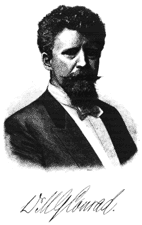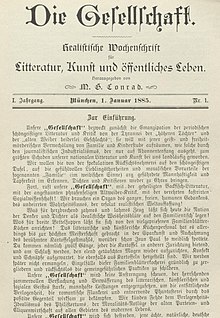Michael Georg Conrad

Michael Georg Conrad (born April 5, 1846 in Gnodstadt / Lower Franconia , † December 20, 1927 in Munich ) was a German writer of naturalism .
Life
Conrad was the oldest son of a farmer from Gnodstadt (today part of Marktbreit ) near Ochsenfurt . He attended the teachers' seminar in Altdorf near Nuremberg to study pedagogy . Later the subjects philosophy and modern philology were added. Conrad later moved to the universities of Geneva , Naples and Paris . He graduated in 1868 with a doctorate to the Dr. phil off.
In the same year he went to Geneva for two years to teach there as a teacher at the German-Lutheran school. There he was accepted into the Masonic lodge L'union des coeurs in February 1870 . In 1870/71 he committed himself to Italy , where he lived until 1878. There he was u. a. as co-founder and master of the chair of the German-speaking lodge Pestalozzi as a Freemason. In 1878 he moved to Paris, where he stayed for five years and worked as a lecturer at the Polyglotte Institute . During the last year of his stay in France, he mostly worked in the Paris office of the Frankfurter Zeitung .
In 1883 the company moved to Munich. Here Conrad soon advanced to become a central figure in the naturalistic movement. In 1885 he founded the journal Die Gesellschaft . In 1891 Conrad was elected to the board of the Society for Modern Living , designed by Julius Schaumberger . He was responsible for the club newspaper Moderne Blätter and for the free stage . This supplemented his publication of the society , in which he wrote numerous essays , editorials and reviews , especially for German literature that was renewed in the sense of realism and naturalism, but also society. He was close to the painter and life reformer Karl Wilhelm Diefenbach , for whom he vigorously campaigned several times, and also supported his temporary adept Gustav Arthur (Gusto) Gräser , the co-founder of the dropout settlement Monte Verità near Ascona.
M. G. Conrad often used a pseudonym : Arthur Feldmann, Hans Frank, Fritz Hammer, Ignotus, Erich Stahl, Erwin Sturm and Vult.
In 1887 Conrad married the Munich court actress and writer Marie Ramlo, who also published under the name Marie Conrad-Ramlo .
From 1893 to 1898 he was a member of the German Reichstag as a member of the constituency Middle Franconia 3 ( Ansbach , Schwabach ) for the German People's Party .
Michael Georg Conrad died on December 20, 1927 in Munich at the age of 81. His grave is in the Gnodstadt cemetery.
Works
- On the question of popular education in the German Reich , free pedagogical-social studies and reform proposals to promote educational science and enlightenment of the people, 1871
- The Lodge in the Kulturkampf , 1875
- " More light ". Critical Considerations on Freemasonry , 1877
- The religious crisis. Translated from Italian, introduced and glossed over by MG Conrad. S. Schottlaender, Breslau 1878
- The last popes. Heretic letters from Rome. 2nd Edition. S. Schottlaender, Breslau 1878; Revisions: The Last Popes. Heretic letters from Rome. With an introduction by Kurt Eggers. Nordland-Verlag, Berlin 1941; The last popes. Heretic letters from Rome. Nabu-Press, 2010. - In particular on Pius IX.
- Lutetia's daughters , narrative, 1883
- Bad Society , Realistic Novellas, 1885
- The emancipated , comedy, 1888
-
What the Isar Rushes , novel in three volumes, 1888
- 1. What the Isar roars
- 2. The wise virgins
- 3. The fool's confession
- Pumpanella , 1889
- The struggle for the existence of literature , 1890
- The modern age , 1891
- Last Truths , 1892
- Social Democracy and Modernity , essay, 1893
- Companion word. In: Oskar Panizza : The German Michel and The Roman Pope. Old and new from the struggle of Teutschtum against Roman-Wälsche outwitting and paternalism in 666 teses and quotations. Wilhelm Friedrich, Leipzig 1894.
- Munich Spring Wonder , Roman, 1895
- In purple darkness , Roman, 1895
- From Emile Zola to Gerhart Hauptmann , autobiography, 1902
- Majesty , a royal novel, 1902
- By pure means , contemporary historical considerations, article for the magazine Der Ruf , 1927 ( online )
Letters
- Gerd-Hermann Susen (Ed.): Wilhelm Bölsche . Correspondence with authors of the Freie Bühne. Berlin: Weidler Buchverlag 2010 (letters and comments), pp. 621–633
- Gerd-Hermann Susen (Ed.): "... because everything modern has gone with us". The correspondence between Hermann Bahr and Michael Georg Conrad. In: Tim Lörke, Gregor Streim, Robert Walter-Jochum (eds.): From the edges to the modern. Studies of German-language literature between the turn of the century and the Second World War. Festschrift for Peter Sprengel on his 65th birthday. Würzburg 2014, pp. 27–61.
literature
- Ernst Kreowski : Majesty, a royal novel by Michael Georg Conrad. Berlin 1902, published by Otto Janke . In: The New Time . Weekly of the German Social Democracy . 20.1901-1902, volume 2 (1902), issue 26 = 52, pp. 830-832. Digitized
- Paul Arthur Loos: Conrad, Michael Georg. In: New German Biography (NDB). Volume 3, Duncker & Humblot, Berlin 1957, ISBN 3-428-00184-2 , p. 335 f. ( Digitized version ).
- Hans Mahr: Michael Georg Conrad. A social critic of German naturalism. Greß, Marktbreit 1986. ISBN 3-920094-49-2
- Hans Merian: The so-called "Young Germans". A presentation. Werther, Leipzig 1889.
- Gerhard Stumpf: Michael Georg Conrad. World of ideas, art programs, literary work. Lang, Frankfurt am Main / Bern / New York 1986 (= European university publications. Volume 1 [= German language and literature. Volume 914]), ISBN 3-8204-8801-4 .
- Jost Hermand: Green Utopias in Germany. On the history of ecological consciousness . Frankfurt / M. 1991.
- Günter Helmes : Michael Georg Conrad: "What the Isar rushes" . In: Reclams Romanlexikon. Stuttgart 1999, pp. 516f., ISBN 978-3-1501-800-20 .
- Michel Durand: Michael Georg Conrad à Paris. 1878-1882. "Années d'apprentissage" d'un intellectuel critique Lang, Bern 2004. (= Convergences; 32) - ISBN 3-03910-396-2
- Clarissa Höschel: Michael Georg Conrad and his 'poetics dispute' with Leopold Ritter von Sacher-Masoch. In: Literature in Bavaria. Issue No. 9 (December 2007), pp. 58-61.
- Clarissa Höschel: MG Conrad's village novel "Der Herrgott am Grenzstein". In: Mainfränkisches Jahrbuch für Geschichte und Kunst, Volume 61 (2009), pp. 280–304.
Web links
- Literature by and about Michael Georg Conrad in the catalog of the German National Library
- Newspaper article about Michael Georg Conrad in the press kit of the 20th century of the ZBW - Leibniz Information Center for Economics .
- Works by Michael Georg Conrad at Zeno.org .
- Works by Michael Georg Conrad in Project Gutenberg ( currently usually not available for users from Germany )
- Works by Michael Georg Conrad in the Gutenberg-DE project
- Works by and about Michael Georg Conrad at Open Library
- Settings of Conrad's poems
- Conrad as a critic. By Oliver Pfohlmann
- Biography of Michael Georg Conrad . In: Heinrich Best : database of the members of the Reichstag of the Empire 1867/71 to 1918 (Biorab - Kaiserreich)
- Michael Georg Conrad in the literature portal Bavaria
Individual evidence
- ↑ Gerd Otto-Rieke: Graves in Bavaria . Munich 2000. p. 56.
| personal data | |
|---|---|
| SURNAME | Conrad, Michael Georg |
| BRIEF DESCRIPTION | German writer of naturalism and politician (DtVP), MdR |
| DATE OF BIRTH | April 5, 1846 |
| PLACE OF BIRTH | Gnodstadt |
| DATE OF DEATH | December 20, 1927 |
| Place of death | Munich |


